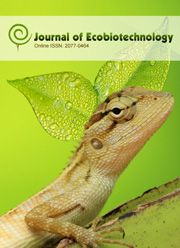Antimicrobial and DPPH Free Radical- Scavenging Activities of the Ethanol Extract of Propolis Collected from India
Abstract
Propolis is a natural product derived from plant resins collected by honey bees. In the present study, ethanolic extract of Propolis (EEP) collected from South India were tested for their antibacterial, antifungal and antioxidative activities. Propolis from Apis mellifera and Trigona sp were collected and compared with the commercial Propolis. EEP from Apis mellifera and commercial Propolis showed higher activity against Staphylococcus aureus and Trigona sp EEP showed higher activity against Candida albicans than commercial. In addition, the total flavanoid and total polyphenol content were analyzed. The chemical compositions of Propolis were identified from Gas Chromatography and Mass Spectrum (GC-MS). The compound 1,4 Di-O-Acetyl-2,3,5-tri-O-Methylribitol (C12H22O7) was found to be first time in the propolis and the rest of the identified compounds were already reported. The results confirms the high DPPH free radical scavenging activity of Indian propolis. Thus Indian propolis, being a rich source of natural antioxidants, may be used in the prevention of various free radicals related diseases.






 .
.